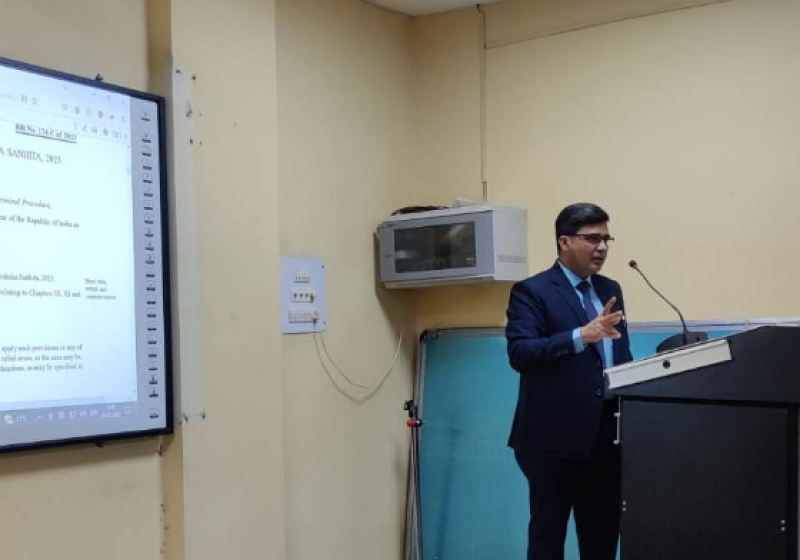New Delhi, February 22: The Faculty of Law, Jamia Millia Islamia (JMI) organized a Workshop to make the teachers and students aware about the new criminal laws namely, the Bhartiya Nyay Sanhita, 2023 and the Bhartiya Nagrik Suraksha Sanhita, 2023 on February 20, 2024 at 10:00 am in the Conference Room, Faculty of Law, JMI. The lectures were delivered by Prof. Nuzhat Parveen Khan & Prof. Mohd. Asad Malik. The session was presided over by Prof. (Dr.) Kahkashan Y. Danyal, Dean, Faculty of Law, JMI and attended by more than 200 participants.
At the very outset during her presidential address, Prof. (Dr.) Kahkashan Y. Danyal gave a warm welcome to the speakers, faculty members and the audience, and put forth the outline and insight of the subject chosen for the discussion and also discussed the objective of conducting such workshop for the holistic approach towards legal education keeping in view the need of the hour. She said that such lectures mostly focus on the philosophy of law and the journey of legal education and practice, its nuances and the way forward.
After that, Prof. Danyal gave some insight about the topic selected for the workshop. She highlighted that these three laws will bring a huge change in our criminal justice system and she also highlighted that the BNSS has laid emphasis on digitisation of the complete process of investigation and mandatory video recording of statements of victims of sexual offences, which was the need of the hour. She further said that these three new criminal laws are being humanized for the first time after so many years of independence. Lastly, she said that this initiative of the government has freed these three laws from the mentality and symbols of slavery. Lastly, she said that when these laws will be implemented across the country in near future, we will see change, in the justice delivery system.
Having said so, Prof. Kahkashan once again extended a warm welcome to the speakers and audience. After that she gave a brief introduction about the speakers and requested them to proceed.
Prof. Nuzhat Parveen Khan introduced the audience to the newly passed Bhartiya Nyaya Sanhita, 2023 and said that in the Bharatiya Nyaya Sanhita (BNSS), priority has been given to crimes related to human body, like rape, gang rape, crimes against children, murder, kidnapping and trafficking etc. She said that the Government has taken a historic decision and completely removed the provision of sedition. She said that the present law has replaced sedition with treason.
She further highlighted that various provisions have been made in these laws for the safety of women and children and a new chapter has been added in the Bharatiya Nyaya Sanhita in this regard. There is a provision for life imprisonment and death penalty for the crime of rape of a woman under 18 years of age. She said that in cases of gang rape, there is a provision of imprisonment of 20 years or imprisonment till death. She emphasized that for the first time after 75 years of independence, the government has given a place to ‘terrorism’ in the criminal laws. She also said that if any death occurs in incidents like use of dynamite, explosive material, poisonous gas, etc., then those responsible for it will be considered involved in terrorist acts.
The Bharatiya Nyaya Sanhita was thoroughly discussed with the changes brought by the new law as well as the comparative analysis with the present Indian Penal Code.
Prof. Nuzhat Parveen’s lecture continued till 11:45 am, and then Prof. Mohd. Asad Malik took over for a discussion on the Bhartiya Nagarik Suraksha Sanhita (BNSS), 2023 which replaced the Criminal Procedure Code, 1973. He initiated his lecture with a brief historical background about the codification and development of the Criminal Procedure Code during the British Rule. Further he made a holistic comparison of the sentencing powers of Magistrates under the Cr.P.C. and BNSS and the provisions for FIR, Arrest, Bail, Remand, Summon, Warrant, Proclamation & Attachment, Cognizance and Trial etc.
He discussed the importance of new definitions added in BNSS e.g. Section 2 (a) "audio-video electronic", Section 2 (b)"bail", Section 2(d)"bail bond", Section 2 (e) "bond" and Section 2 (i) "electronic communication". He said thatthe BNSS mandates forensic investigation for offences punishable with seven years of imprisonment or more. Forensic experts will visit crime scenes to collect forensic evidence and record the process. He said that under the BNSS all trials, inquiries, and proceedings may be held in electronic mode. Production of electronic communication devices, likely to contain digital evidence, will be allowed for investigation, inquiry, or trial.He emphasized that use of scientific method/forensic in investigation will not only ensure transparency and accountability in police probes, but will also improve the quality of evidence and help in protecting the rights of both the victim and the accused and it will certainly be helpful in increasing the conviction rate.He also told about inclusion of section 356 in BNSS which says that if a proclaimed offender has absconded to evade trial and there is no immediate prospect of arresting him, the trial can be conducted and judgment can be pronounced in his absence.
He said that now the provision of Zero FIR and E-FIR has been introduced in section 173 of BNSS and under this provision the police will register FIR irrespective of the area where the offence is committed and if an FIR is registered through electronic communication, it shall be taken on record by him on being signed within three days by the person giving information. He also explained the Preliminary Enquiry which may be conducted by officer-in-charge of the police station if any cognizable offence punishable for three years or more but less than seven years to ascertain whether there exists a prima facie case for proceeding in the matter within a period of fourteen days or not.
He also discussed about deemed sanction under BNSS in second proviso to Section 218 (1) a provision of deemed sanction is added i.e., if a sanction is not received to prosecute the public servant within 120 days, the sanction would be considered as deemed sanction to prosecute the public servant.
Prof. Malik emphasized that the main focus of the BNSS is to provide speedy justice and the government has incorporated many provisions for providing time bound justice keeping in view the rights of accused as well as the victim. Prof. Malik further said that Section 230 of the BNSS prescribes fourteen days for the supply of relevant documents to the accused as well as to the victim. Under section 232 the proceedings of commitment of case shall be completed within a period of ninety days from the date of taking cognizance, and such period may be extended by the Magistrate up to one hundred and eighty days but the magistrate has to record the reasons in writing. The timeline for framing of charges and filing discharge application has been given in BNSS. A sixty-day timeline has been given for framing the charges.
This period will be counted from the first hearing on charge and the accused may prefer an application for discharge within a period of sixty days from the date of commitment of the case under section 232 in sessions trial cases and within a period of sixty days from the date of supply of copies of documents under section 230 in warrant trial cases. The BNSS also prescribes that a judge, after hearing the arguments, shall give his/her verdict within a period of thirty days which is extendable up to 45 days. To avoid unnecessary delay in providing the certified copy of the judgment, the BNSS under section 392 provides that the Court shall, as far as practicable, upload the copy of the judgment on its portal within a period of seven days from the date of judgment.
Prof. Malik finally added that the compulsory provisions for video recording of evidence, search and seizure have been added in BNSS, which will greatly help in maintaining the fairness in the delivery of justice.
The Workshop was a much needed exercise to create awareness, critical analysis and debate over the provisions of the new Criminal Laws and was followed by question-answer session. The audience put forth various questions on the subject and the same were responded comprehensively by the speakers to the satisfaction of the audience.
Before the formal vote of thanks, Prof. (Dr.) Kahkashan Y. Danyal, Dean, Faculty of Law, JMI summarized the lecture in a very precise manner which was praised by the audience of the day as well.


